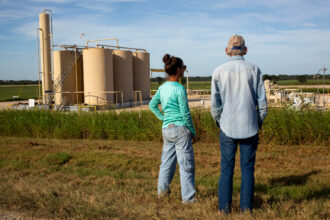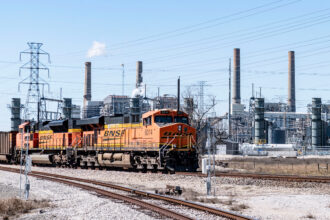A federal judge this week rejected a third appeal by ExxonMobil in the 12-year legal battle over toxic emissions from one of the Texas-based energy giant’s Gulf Coast facilities.
The Fifth Circuit Court of Appeals in New Orleans upheld a $14.25 million fine—thought to be the largest-ever fine resulting from citizen enforcement of environmental law—in a lawsuit brought by environmental organizations against Exxon’s massive complex in Baytown, some 25 miles outside Houston.
The decision still doesn’t guarantee a conclusion to the long-running case, which Exxon may be able to appeal further.
“It’s frequently in the interest of a company to drag out cases for as long as possible to try and get the other side to give up, but we are not giving up,” said Josh Kratka, senior attorney at the National Environmental Law Center, which represented the plaintiffs in the trial. “We hope this is the end of it.”
The suit was first filed in 2010 by Environment Texas and the Sierra Club under the citizen suit provision of the Clean Air Act, which empowers civilians to sue polluters for violations of federal environmental law.
The plaintiffs originally alleged that 16,386 illegal air emissions events, which Exxon disclosed in its own reports, affected the health of communities around the Baytown refinery. A district court in 2017 ordered the Texas-based energy giant to pay almost $20 million.
Exxon appealed, arguing that not all of those violations could be directly traced to specific health problems. Upon review, the court reduced the number of actionable violations to 3,651 and reduced the fine to $14.25 million. Exxon appealed again, contesting the court’s legal standing and the size of the fine.
“This is a standard tactic. It just goes to show the lengths that polluters will go to to prevent true justice from coming forward,” said Stefania Tomaskovic, director of the Coalition for Environment, Equity and Resilience in Houston. “It’s always a struggle to protect our air when companies have so much money to hire lawyers and citizens are not as well resourced.”
On Tuesday, a federal judge rejected Exxon’s latest appeals. The judge upheld the high fine in part due to elements of the Clean Air Act designed to ensure that paying emissions fines isn’t a cheaper alternative for polluters than building adequate facilities.
“The company delayed implementation of four emission-reducing projects mandated by a 2012 agreement between Exxon and state regulators,” said the court opinion issued this week. “Exxon needed to invest $11.75 million dollars in improvements to comply with its Clean Air Act obligations.”
Founded in 1919, Exxon’s Baytown refinery has the fourth largest production levels in the U.S. and is the second largest Exxon refinery in the world (after the company’s Singapore facility).
This story is funded by readers like you.
Our nonprofit newsroom provides award-winning climate coverage free of charge and advertising. We rely on donations from readers like you to keep going. Please donate now to support our work.
Donate NowExxon calls its Baytown campus the “largest integrated petrochemical complex in the U.S.” and “one of the most technologically advanced petroleum and petrochemical complexes in the world.” It includes a refinery, two chemical plants, an engineering office and a technology center.
The facility was the site of a major explosion and fire in late December 2021, prompting another lawsuit from local community members.
Exxon did not immediately respond to requests for comment on Thursday.
“Exxon’s Baytown complex is the largest polluter on the Houston Ship Channel,” said Neil Carman, clear air program director for the Lone Star chapter of the Sierra Club, a plaintiff in the case. “Exxon still needs to do more to create cleaner air in the Houston area.”
About This Story
Perhaps you noticed: This story, like all the news we publish, is free to read. That’s because Inside Climate News is a 501c3 nonprofit organization. We do not charge a subscription fee, lock our news behind a paywall, or clutter our website with ads. We make our news on climate and the environment freely available to you and anyone who wants it.
That’s not all. We also share our news for free with scores of other media organizations around the country. Many of them can’t afford to do environmental journalism of their own. We’ve built bureaus from coast to coast to report local stories, collaborate with local newsrooms and co-publish articles so that this vital work is shared as widely as possible.
Two of us launched ICN in 2007. Six years later we earned a Pulitzer Prize for National Reporting, and now we run the oldest and largest dedicated climate newsroom in the nation. We tell the story in all its complexity. We hold polluters accountable. We expose environmental injustice. We debunk misinformation. We scrutinize solutions and inspire action.
Donations from readers like you fund every aspect of what we do. If you don’t already, will you support our ongoing work, our reporting on the biggest crisis facing our planet, and help us reach even more readers in more places?
Please take a moment to make a tax-deductible donation. Every one of them makes a difference.
Thank you,













